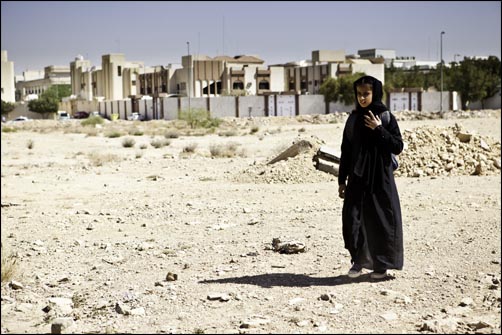
It’s not often films get released and automatically write themselves into the history books. Wadjda (2012, 96 mins.) has by default assumed some historical significance as it’s both the first filmed on location in Saudi Arabia and the first directed by a woman. A general cultural awareness should highlight the importance of this as the Arab state is known for its religious repression and female subjugation. Given these circumstances one may be forgiven for expecting a film that conforms to the society it emerges from, however while Wadjda respectfully handles its culture the content tugs at its restraints.
As the film opens we see a pair of Converse amongst many pairs of conservative black shoes. These are the feet of the eponymous Wadjda (Waad Mohammed), a young girl more interested in having fun than taking her religious schooling seriously. In fact, the only time she does take it seriously is when a Quran recital competition at school offers a substantial cash prize. It’s not about the money, per se, but because Wadjda has a dream — she wants a bike in order to race her friend Abdullah. The only problem being that in her culture it is forbidden; bikes, like most things in Saudi Arabia, are for boys only.
Although the film is named for Wadjda, it is not exclusively about her. Instead, director Haifaa Al-Mansour takes us into the enclosed world of Saudi women with Wadjda acting as a bridge between the domestic and wider world. While home is not a million miles from western comfort — pop music, microwaves, and video games — the outside world is a harsher experience where uncovered woman cannot be seen by men. Or, indeed, heard. As hushed schoolgirls are told for laughing: “A woman’s voice is her nakedness.”
Behind closed doors everyone has their problems. Wadjda’s father is considering taking a second wife to provide him with a son, much to the disappointment of her mother (Reem Abdullah). That she can’t voice an opinion on this is an injustice. At school there’s a rumour going around that Wadjda’s teacher, the strict Ms. Hussa (Ahd), may not be practising what she preaches. At the same school a classmate is married off. All such scenarios are played without judgement. If there are to be any questions over the morality of child brides in Saudi Arabia, then they perhaps belong in the same bucket as the sexualisation of young girls prevalent in the west — the imported T-shirt Wadjda wears at home carries the line ‘I am a GREAT catch!’
In a way, she is a great catch: for a debut role, and at a young age, Mohammed’s performance seems to come naturally. Her portrayal is innocent and good humoured — some parity, perhaps, between actress and character. — and it’s easy to warm to her and, in her dream to have a bike, root also. However, Reem Adbullah and Ahd, as mother and teacher respectively, put in the best performances. The former sad in the way her life holds her back, be it from singing or just having a happy family but ultimately happy for having her daughter. And the latter as a cold, harsh mistress extremely devout as to hide her transgressions.
As Al-Mansour shows us these scenarios and invites us to form our own opinions of Saudi mores, what we see in Wadjda is a young girl on the cusp of womanhood, innocent of what’s expected of her and instead having the temerity to reach out and grab what she wants. To have a dream and see it through. While this may be difficult for many women in Saudi culture for now, and unlikely to be a clarion call to rise up since the county’s a cinema desert, it implies that a forward momentum is possible. The motif of a bike suggest the pedals are already turning.
